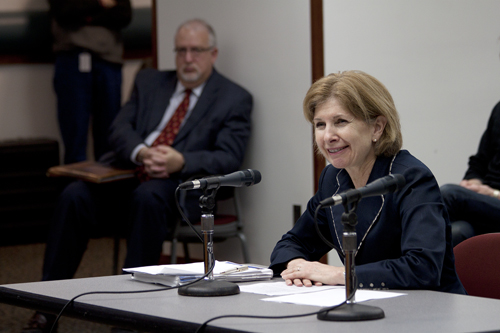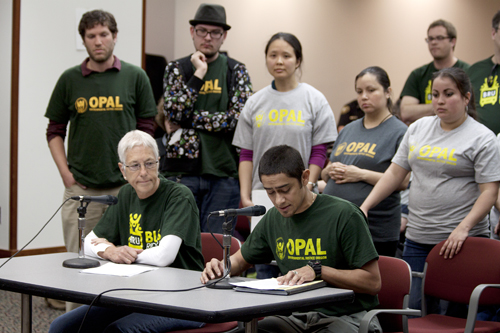Tension remains high between TriMet and its ridership after a public hearing on the agency’s final budget proposal on April 25. The meeting marked a continued effort by TriMet to elicit riders’ opinions and concerns on proposed systemic changes made to close the budget gap of $12 million for the 2013 fiscal year. The final proposal, announced April 11, would include, among other things, the elimination of fare zones and the MAX Free Rail Zone, the move to a flat-fare system, and bus service cuts and reconfigurations.
TriMet’s budget battle continues

Tension remains high between TriMet and its ridership after a public hearing on the agency’s final budget proposal on April 25. The meeting marked a continued effort by TriMet to elicit riders’ opinions and concerns on proposed systemic changes made to close the budget gap of $12 million for the 2013 fiscal year. The final proposal, announced April 11, would include, among other things, the elimination of fare zones and the MAX Free Rail Zone, the move to a flat-fare system, and bus service cuts and reconfigurations.
At the public hearing, TriMet officials read aloud its final proposal to a room in the Portland City Building populated with TriMet board members and officials and members of the riding public. After reports on the budget from TriMet General Manager Neil McFarlane and Chief Financial Officer Beth deHamel, the floor was opened to a slew of public input, ranging from a brief demonstration by Occupy Portland members to one rider’s concerns with the seasonal heating and cooling of the buses.
In a significant demonstration of organization, impressive clarity and cohesion, a group of green shirt-clad members of Organizing People Activating Leaders Environmental Justice Oregon crowded the small table for public comment. Befitted with two microphones, OPAL members presented their own proposed budget and took turns relating stories, politely voicing opposition to TriMet’s plan.
Khahn Pham was one of OPAL’s members who spoke to TriMet officials. Pham, the organization’s strategic communications associate, is also a first-year graduate student in the School of Urban Studies and Planning at Portland State. He addressed some of the more urgent issues regarding TriMet’s proposed plan.

“After cutting 200,000 service hours of bus service for the past three years, bus riders cannot stand for further reductions,” Pham said. “We applaud TriMet’s efforts to find more opportunities to save money through internal efficiency measures and urge the agency to be fully transparent about all discretionary expenses and to look under every rock for more dollars.
“The cost-saving measures proposed by Bus Riders Unite amount to almost $10 million, showing that we can balance the budget without resorting to fare hikes and service cuts, helping TriMet attract more riders to sustain a transit system that works for everyone,” Pham concluded.
In an email interview, Pham voiced hope for the consideration of her organization’s proposal and celebrated the listening of board members. “During our presentation and afterward as the board asked questions, I felt a definite shift in the room—both in how TriMet viewed us and how we view ourselves. OPAL really raised the bar—showing that working-class people, immigrants and people of color can meaningfully engage in budget making,” Pham said. “As transit riders, we need to be at the decision-making table determining solutions for a transit system which our lives depend on.”
There was a feeling of reciprocal respect in the room as OPAL members spoke. TriMet board member Travis Stovall, who represents east Multnomah County, vocalized his appreciation of OPAL’s professionalism. “I’m also impressed with the respectfulness of the time and the appreciation of the presentation that you just made, so my hat’s off to all the efforts that have been made, and I certainly want to give [OPAL’s budget proposal] every opportunity to be looked at as we look forward,” Stovall said.
Occupy Portland also staged a brief demonstration, during which a call and response style of speech was invoked, communicating an opinion that “public transit is under attack.” In response to TriMet’s proposal, Occupiers said, “Hell no.”
On the other side of the equation, McFarlane voiced his own opinion of where things now stand. “We’ve been at this budget balancing process now for six months, and we’ve had literally 16,000 comments from riders and people. So I think we come to this first reading of our ordinances and the first consideration of the budget with a great deal of knowledge about what our riders and our constituents want and are concerned about,” McFarlane said.
Summarizing those comments over the last few months, the general manager pointed to two main messages that have come from public meetings.
“One is protect service—that service is the most important thing to people, and that has been overwhelmingly what we saw. When we had potential cuts to bus routes, we had hundreds of people show up in response to those. So it really showed that that was really the public’s greatest concern,” McFarlane said.
Speaking cautiously about the second message, McFarlane observed that there seems to be “a tolerance for a fare increase if the service levels can be protected. Now that’s not unanimous, and not everybody loves a fare increase, and we don’t love a fare increase, but it’s the trade off of needing to balance a budget on an annual basis,” McFarlane added.
The meeting was scheduled not to adopt any budget plan but only to vote to approve the draft’s submission to the Multnomah County Tax Supervising and Conservation Commission. TriMet can still change the budget from now until the final budget board meeting scheduled in June. The tax commission will hold a public meeting on TriMet’s approved budget on May 25.
“We think this budget does a good job of preserving the most important service,” McFarlane said. “We’re trying to streamline the service so that nobody loses service, but perhaps we can make the system more efficient for the future.”






I have been following transit news from around the world for years now.
I consider myself somewhat an expert on these issues.
OPAL should be commended for its excellent well thought out proposal.
The greatest accomplishment of the OPAL group- YOU DO NOT NEED SIX FIGURE EXECUTIVES TO COME UP WITH BUDGETS!
All the work they did they did on their own, and that is indeed a major thing.
Now on to TriMet executives. If you had been following these cuts around the country you would find ALMOST IDENTICAL PRESENTATIONS AND CONCLUSIONS!
Almost as if there is a “template” that these transit executives are following.
I have absolutely no faith in what they say, it’s all been planned out.
The show is staged for the public’s benefit.
I don’t want to hear nice words about OPAL-I want to see ACTION based on OPAL’s ideas.
Make me a believer in the system, please.